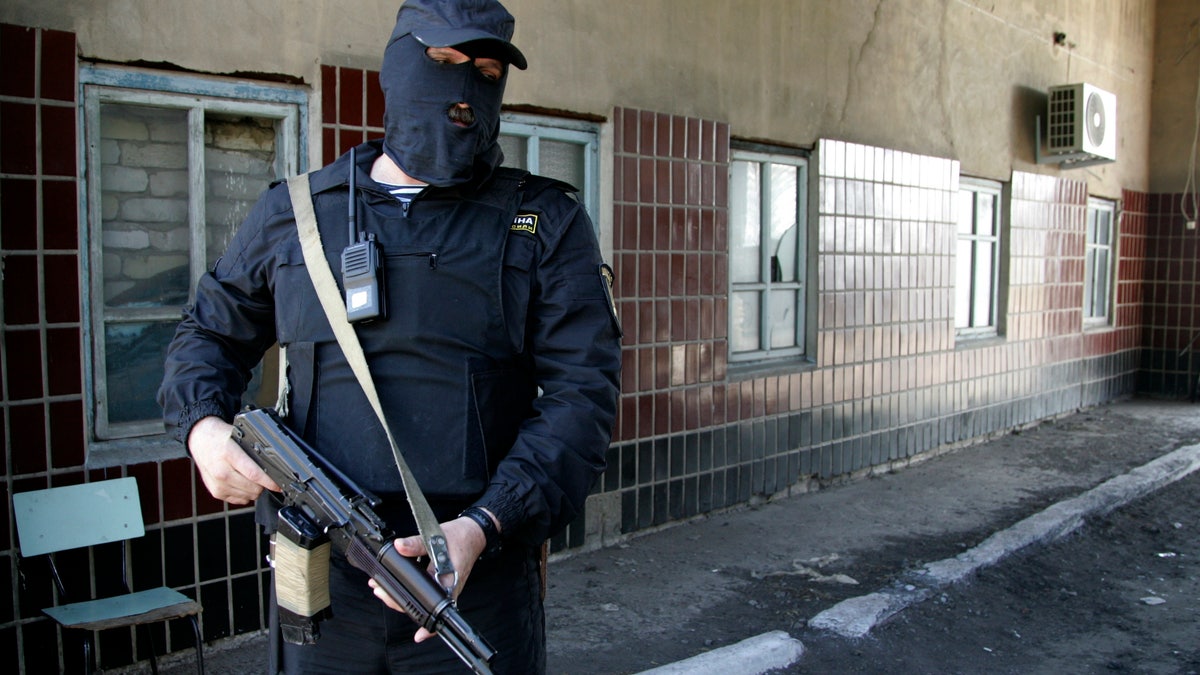
May 16, 2014 - An armed man of the Donbass Battalion, a non-affiliated militia group that has stated its intent to fight in support of Ukrainian unity, is on guard at a base near Donetsk, eastern Ukraine. The group says it has reclaimed Velyka Novosilka from pro-Russian separatists with the self-styled Donetsk Peoples Republic, an anti-government movement that has over the past few weeks been seizing government offices and declared its intent to merge the Donetsk region with Russia. (AP)
A bipartisan group of lawmakers has introduced legislation banning Pentagon contracts with Russian arms dealer Rosoboronexport amid the crisis in Ukraine.
The proposal by Sens. Dan Coats, R-Ind.; John Cornyn, R-Texas; and Richard Blumenthal, D-Conn., would forbid the direct or indirect use of U.S. tax dollars to enter contracts or agreements with the company and end all existing contracts.
The Russian Weapons Embargo Act of 2014, introduced on Thursday, would also prohibit Defense Department contracts with any domestic or foreign company that cooperates with Rosoboronextort to design, manufacture or sell military equipment, according to a news release.
"Given Russia’s hostile actions in Ukraine, business as usual is unacceptable,” Coats said in a statement. "With American credibility and the future of the international order on the line, our actions should reflect that. This specific economic sanction will harm Russian interests in a serious way without damaging America’s economy."
The Pentagon has a $553.8 million contract with Rosoboronexport to purchase 30 Mi-17 transport helicopters for Afghanistan's air force, according to The Hill. The DoD has already spent $546.4 million on 33 helicopters.
Blumenthal said recent events in Ukraine underscore why the U.S. should stop doing business with Russia and its state-owned arms dealer.
"This legislation sends a clear message to Russia and Rosoboronexport: America will not do business with countries that behave irresponsibly and companies that arm terrorist regimes," Blumenthal said in a statement.
Meanwhile, in Ukraine, local patrols by steelworkers have forced the pro-Russian insurgents to abandon the government buildings they had seized in Mariupol.
The move is a setback to forces that have established footholds in eastern Ukraine as they demonstrated opposition to the interim Ukrainian government in Kiev.
In Washington on Friday, the White House welcomed the move by insurgents.
"We certainly welcome any indication that separatists who ... have seized buildings, who have set up roadblocks, stockpiled weapons, are vacating buildings and ceasing the kinds of activities that have only destabilized the situation in Ukraine and led to confrontations and violence," White House spokesman Jay Carney told reporters.
"So that would certainly be a good development," he said.
Carney noted that the moves come a little more than a week before a May 25 election to choose a permanent government.
The U.S. and its allies are working to help ensure that the elections go forward problem-free, and have warned Russia against trying to influence the outcome.
"The situation is calm and preparations are on track," Carney said. "That's certainly a good thing and a welcome development."
The Associated Press contributed to this report.




